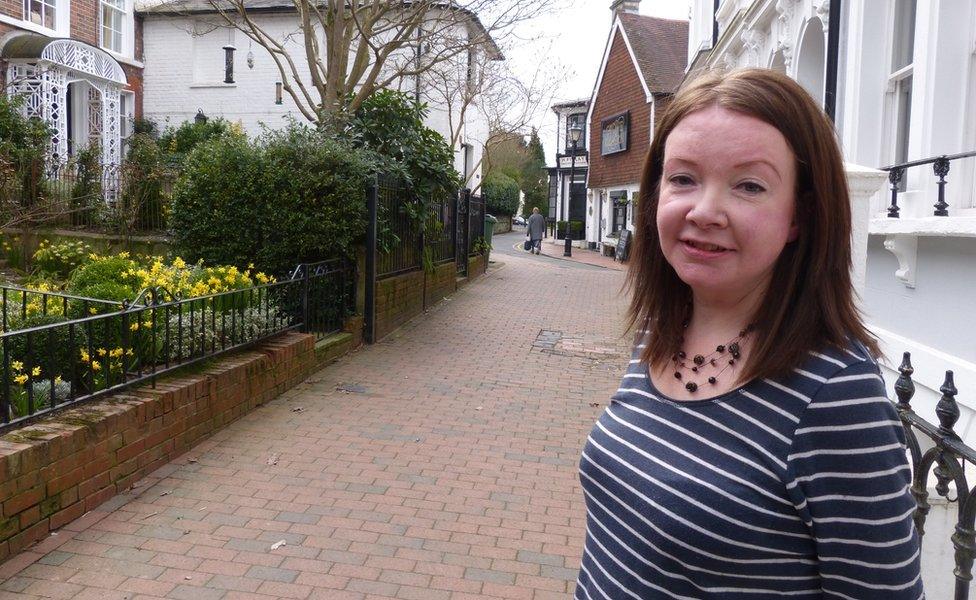The new Innovative Finance Isa: How risky will it be?
- Published

Hazel Muir from Kent is keen to transfer cash to an IF Isa
Until February this year, it all sounded terrific: A new Individual Savings Account (Isa), which instead of offering cash savers as little as 0.5% a year, would instead offer returns of up to 6%, tax-free.
Yippee!
But just weeks before launch day in April, Lord Turner, the former boss of the Financial Services Authority, let off an intellectual grenade designed to inflict serious damage on the whole idea of what is known as Peer-to-Peer (P2P) lending.
Speaking on Radio 4, he predicted that over the next five to ten years there would be huge losses for P2P lending platforms, which would make the banks look like "lending geniuses".
He implied that, far from increasing their savings, hundreds of thousands of investors could end up losing their money instead.
So what does the Innovative Finance Isa (IF Isa) involve? And how risky will it be?
P2P lending
Peer-to-Peer (P2P) lending simply means that, as an investor, you will be lending out your money - rather like being your own bank manager.
The borrowers can be individuals - perhaps wanting cash for a new car or a house extension - or businesses. They pay the money back over time, with added interest.
It all began ten years ago, when a platform called Zopa began matching up lenders and borrowers, without using a bank as an intermediary. But from 6 April 2016 the Innovative Finance Isa (IF Isa) will enable lenders to earn their interest free of income tax for the first time.
"They're a half-way house between a cash Isa, which is safe, but very low return, and a stocks and shares Isa, which is a bit more racy, and where you carry more risk," says Christine Farnish, chair of the P2P Finance Association.
Across all their Isas, investors will be able to put in up to £15,240 in the 2016/17 tax year, and £20,000 from April 2017.
Those able to commit that amount to an IF Isa for a five year lock-in period could potentially earn up to £914 a year in interest.

Return on £15,240
Cash Isa
up to £355 a year (2.33%)
IF Isa
up to £914 a year (6%)

How risky will IF Isas be?
If all goes well, the people or businesses you lend to will pay you your money back, over time, with added interest.
But Lord Turner accused the lending platforms - like Zopa, Funding Circle and Ratesetter - of not doing proper checks on their borrowers: What he called "kick the tyres type credit analysis."
If your borrowers cannot repay, you will, in theory, lose your money. And unlike Cash Isas, that money will not be protected by the Financial Services Compensation Scheme (FSCS). So money put into an IF Isa looks more like an investment than savings.
Furthermore critics argue that P2P lending has never really been tested, as most of it has grown up since the financial crisis. After 7 years of cheap money, a rise in interest rates or another economic shock could hit many people's ability to repay. Especially if businesses are "sub-prime" to start with.

'Relatively safe'
But the lending platforms reject Lord Turner's arguments entirely. Funding Circle, which only lends to businesses, claims its processes are more rigorous than most banks.
Ratesetter - a third of whose loans go to business - says its lending criteria are so strict that only one in five borrowers is approved. And as an investor, your loans are typically spread across hundreds of borrowers, minimising the risk.
Zopa, which was founded in 2006, did live through the financial crisis. Default rates went up, meaning investors suffered lower interest payments, but no-one lost their original capital.
In fact most P2P platforms also have contingency funds to protect investors from loan defaults - allowing them to boast that so far no investors have been left out of pocket.
"You obviously are at risk of loan defaults, but so far the history is good," says Christine Farnish. "The platforms' annual default rates are between 2% and 3% - so actually it is relatively safe."

Case Study: Hazel Muir

Having trained as an astro-physicist, specialising in extra galactic matter, Hazel Muir tends to have an eye for long-distance detail.
She calculates that over time an IF Isa will increase her annual returns by a factor of 12. Her own bank is offering just 0.5% interest on Cash Isas, while she expects to get 6% from an IF Isa.
"I consider it to be medium risk," says the science writer from Tunbridge Wells. "There could be some contagion if things go wrong. To me it's all about eggs and baskets, and most of my savings are low risk."
She is also furious with Lord Turner.
"He didn't distinguish between lending to businesses and individuals. That led me to believe he had an agenda."

Advice
Most experts say it is not an investment suitable for everyone, and those who do decide to try it should start slowly.
"Dip your toe into the water for the first time," says Danny Cox, investment expert with Hargreaves Lansdown.
"Never over-commit to any one asset class, whether that be equities or fixed interest or anything else. And go with one of the bigger providers."
He also advises that an interest rate that looks exceptionally high is likely to carry higher risk, so might be best avoided.
Rebecca O'Keeffe, from the Glasgow-based provider Interactive Investor, warns people to understand who they are lending to, how their risk is diversified, and whether there are safety funds to protect them.
From later this year, IF Isas will become even more complex, as they are extended to include debt-based crowdfunding - allowing investors to lend money, for example, to alternative energy projects.
The government is consulting on whether to go even further, and allow Isa investors to put cash into equity-based crowdfunding too, although the regulator regards such investments as much more risky.